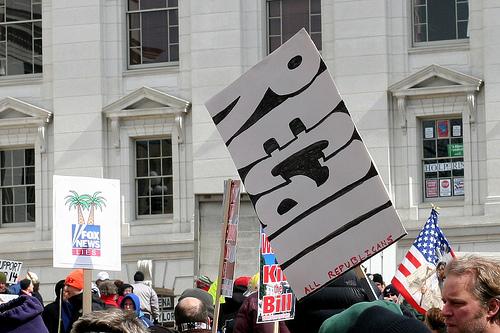The national implications of Scott Walker’s victory in Wisconsin
After more than a year of protests calling for the recall of Scott Walker, Tuesday’s election resulted in a seven-point victory for the incumbent governor. (Photo courtesy of Sue Peacock via Flickr.)
The poll results may be in, but for those who follow the pulse of politics, Scott Walker’s victory is just the beginning.
According to Amy Kremer, a chairwoman of Tea Party Express, Walker’s victory is a sign of enduring Tea Party strength.
“There is a clear takeaway for conservatives across the country, which is that they want fiscal conservatives that are willing to take the bold necessary steps to reign in out of control spending and live within our means,” Kremer said. “Everybody has to give a little bit. What Governor Walker and the lieutenant governor have done is close that $3.6 billion deficit. They’re creating jobs. That’s what Washington needs to be doing.”
Nick Nice, an organizer in Madison, Wisc., who has worked closely with the movement to recall Walker said he’s optimistic despite Walker’s victory.
“I’m doing pretty good considering the circumstances. We got the senate back, I’m feeling positive about that,” Nice said.
Four state senators were up for recall on Tuesday and it seems Democratic Senator John Lehman will take the seat from incumbent Republican Van Wanggard with a margin of just fewer than 1,000 votes. Wanggard has yet to concede to Lehman’s, but if the votes fall in his favor, Lehman’s victory will shift control of the Wisconsin state Senate from the GOP to Democrats.
“We’ll see if Governor Walker is actually willing to work and bridge the divide as he likes to talk about,” Nice said. “I think it’ll be an interesting session coming up here trying to work with a Democratically-controlled senate.”
The great divide between Walker supporters and detractors in Wisconsin was sparked in early 2011 when Walker proposed heavy cutbacks on collective bargaining rights for public workers.
Joe Nocera, an op-ed columnist for the New York Times who has written about the decline of unions in America said unions don’t have the same kind of clout today that they once did.
“They don’t have the kind of cash that business has, so they do wind up acting more and more like a special interest group,” Nocera said. “They’re trying to up-end a 30-year trend, and that is awfully hard to do. They’re also operating, on some level, out of desperation.”
In an op-ed published Tuesday, Nocera wrote that close to 40 percent of American workers were union members or benefitted from union contracts in the mid-1950s. That number has dwindled down to 12 percent in 2012. Nocera thinks Walker’s victory could set a precedent for conservatives in other states to attack the remaining unions.
“My fear is that this will happen again and again and again now that we have the Scott Walker example.” he said.
Voters have begun to question what Walker’s victory could mean in November’s election.
Shawn Johnson, the capitol reporter for Wisconsin Public Radio, said poll results showed Walker supporters in unlikely places.
“It’s peculiar. This group of voters that sent Governor Walker back to office by a solid margin would have elected Barack Obama over Mitt Romney by exit polls,” Johnson said. “So you have to ask what’s at play there. Anecdotally, I know there’s a lot of voters that I talked to out on the campaign trail that said they don’t completely agree with everything Governor Walker did, but they don’t like the idea of the recall. They think he should be allowed to finish his term.”
Kremer from the Tea Party and recall Walker proponent Nick Nice hope Wisconsin’s leadership will be able to surmount their ideological differences in the coming months.
“We’re not going to get anywhere if we just keep fighting with each other. That’s something both sides can agree on,” Nice said.
“I completely agree,” Kremer said. “We just want what’s best for this state and the people across the country. None of these governments have their own money. They collect our money and spend our money, and we want the out of control spending to stop.”
Our coverage reaches millions each week, but only a small fraction of listeners contribute to sustain our program. We still need 224 more people to donate $100 or $10/monthly to unlock our $67,000 match. Will you help us get there today?
